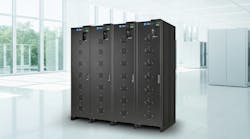The Big Short and The Data Center Sector: What History Tells Us
For the past two weeks, data center investors, analysts and operators have been debating a headline-making prediction from Jim Chanos, a high-profile investor known for his prowess as a short seller. Chanos’ latest target for short selling – a strategy where an investor benefits as a stock declines – is the data center industry.
“This is our big short right now,” Chanos said in an interview with the Financial Times. “The story is that although the cloud is growing, the cloud is their enemy, not their business. Value is accruing to the cloud companies, not the bricks-and-mortar legacy data centers.”
The Chanos prediction has received widespread coverage in the financial press, as well as significant pushback from leading data center REITs and securities analysts. We’re not financial advisors here at DCF, and past performance is no guarantee of future results. That said, from a news perspective, we thought it might be instructive to look at the history of market forecasters who have gone public with bets against the data center sector.
There have been several examples of high-profile investment personalities urging investors to sell or short the shares of data center providers, anticipating that these companies’ stock prices would head lower. But betting against the data center sector has been a tricky business, especially during a huge societal shift to digital delivery of products and services.
Jim Cramer: “Sell, Sell, Sell”
On Oct. 22, 2009, CNBC personality Jim Cramer warned his legions of viewers that the data center industry was ready for a fall. “Get out of the data center stocks,” Cramer told viewers. “I think the data center industry is in decline. I see an industry that’s about to be brought low by new technology, so I think you should sell, sell, sell.”
This was a time when Cramer’s calls regularly moved markets. I found the rationale for his prediction to be imbued with goofiness, and said so on DCK.
Cramer doubled down on that call in January 2011, focusing on colocation provider Equinix. “I would be a seller of EQIX because I don’t think the data centers, the physical space, is going to grow the way people think,” Cramer opined during the “Lightning Round” segment of his show. We updated the track record of that call, along with Cramer’s 2009 sell signal, in a March 2012 article titled “The Hugeness of Jim Cramer’s Data Center Miss.”
Short version: Cramer’s “Sell, Sell, Sell” was Wrong, Wrong, Wrong. Investors who followed his advice missed out on a historic rally in data center stocks, with Equinix gaining 88 percent in value during that period, and looking like a laggard compared to industry rivals Terremark (up 172%), NaviSite (up 151%), Rackspace (up 139%) and Savvis (up 122%). Digital Realty, DuPont Fabros and Akamai were all between 50 and 65 percent higher.
” I see an industry that’s about to be brought low by new technology, so I think you should sell, sell, sell.”
Jim Cramer on data centers in 2009
Cramer seemingly didn’t understand the historic relationship between faster chips and data center demand. He noted strong sales for Intel’s new family of Nehalem DP processors, one of which can “take the place of eight to nine older-generation servers.” Cramer did some math, and concluded that data centers will soon be seven-eighths empty.
Nehalem was the latest in a series of regular technology updates from Intel, each of which introduced faster and more powerful processors, and none of which emptied out data centers. Here, history could have been an aid to Cramer. It would have been simple to compare the launch of faster Intel chips and data center growth to test his thesis.
Cramer later came around on the power of cloud computing, and began to feature CEOs of data center REITs on his”Mad Money” show.
Highfields’ Short Call on DLR
On May 8, 2013, hedge fund executive Jonathon Jacobson of Highfields Capital Management asserted that investors should short shares of Digital Realty Trust, saying the huge data center developer relied on the capital markets to fund its dividend and was understating the future investment in facilities that would be required to support its enterprise customers.
Digital Realty shares fell 7% in the next trading session, to about $64. Jacobson said the fair value of Digital Realty should be about $20 a share. Digital Realty responded publicly, saying Highfields was “mischaracterizing and drawing inaccurate conclusions” from its disclosures.
Data center maintenance may not seem like a sexy topic for Wall Street. But the Highfields short call made data center maintenance expenses a hot topic in earnings calls. Digital Realty sought to put the issue to rest by updating its accounting, saying it would no longer account for maintenance costs below $10,000 as capital expenditures, rather than operating expenses, as had previously been the case.
The issues Highfields raised about maintenance costs brought changes to industry best practices, and ultimately more transparency for data center investors.
A year later, in May 2014, shares of Digital Realty traded at $54.50 – about 20 percent lower than before the Highfields short call. At one point in Dec. 2013, shares of DLR fell to $44.12, or about about 36% lower.
That price represented a meaningful possible gain for a short seller, but remained nearly twice Jacobson’s predicted fair value. By 2015, Digital Realty was back in the mid-60s, and would soar to $117 a share by 2017.
Although Jacobson’s prediction of a $20 share price was a miss, the shares did indeed head lower and offer a modest gain for short sellers. Perhaps more importantly, the issues Highfields raised about maintenance costs brought changes to industry best practices, and ultimately more transparency for data center investors.
Taking Stock of Chanos ‘Big Short’ Prediction
So what should data center observers make of Chanos’ “big short” call? Institutional Investor recently called Chanos “arguably the most well-known short seller in the world.” He gained prominence from a high-profile short call on Enron a year before the energy company collapsed in fraud and disgrace. He has also some high-profile misses, including a short call on Tesla.
In a recent appearance on the Bloomberg Odd Lots podcast, Chanos said that he believes sustained higher interest rates will be bad for real estate investment trusts (REITs), the corporate structure used by most public data center operators. He also said that investment sectors fueled by excess liquidity and speculation have a tough road ahead.
In the Financial Times article, Chanos noted that much of the data center sector’s growth has been fueled by hyperscale customers, which includes cloud platforms and social networks. Chanos predicted that this apparent strength could become their undoing.
“The real problem for data center REITs is technical obsolescence,” Chanos told the FT. “Their three biggest customers are becoming their biggest competitors. And when your biggest competitors are three of the most vicious competitors in the world, then you have a problem.”
The key question is how well Chanos understands the relationship between the hyperscalers and data center REITs. Are they competitors? That would be true if hyperscalers were bringing more of their data center construction in-house. There’s evidence the opposite is happening, and the cloud platforms are working more closely with data center REITs on build-to- suits as a way to cope with construction supply chain challenges. That’s what the blockbuster 1Q leasing seems to indicate.
Here are some stories that present context and feedback to Chanos’ commentary:
- Digital Realty CEO: Data Center Demand Has Never Been Stronger (Data Center Dynamics): “I think Jim (Chanos) maybe isn’t aware that demand has never been stronger in our space,” said Bill Stein, the CEO of Digital Realty. “He refers to cloud service providers as our competitors, but we view them as our partners, and they view us as partners. We enable their growth around the world.”
- Betting Against Data Center REITs is a Very Dangerous Short (CNBC YouTube): Jeff Richards, GGV Capital managing partner, said that over the long term. enterprise customers are not likely to abandon data centers to go all-cloud.
- Jeffries Opposes Chanos; Arguments, Backs Data Center REITs (Yahoo Finance): Analyst Jonathan Peterson of Jefferies said he expects data center REITs to thrive for the foreseeable future and “should continue to benefit from the post-pandemic occupancy recovery.”
- Will Cloud Giants Really Drive Colos off a Financial Cliff? (The Register): This analysis notes that Chanos’ thesis “appears to overlook several important factors,” including strong demand coming out of the pandemic and the growing service diversification of the largest public players, especially Equinix and Digital Realty.
- “I wouldn’t Take This Bet”: For a broader cross-section of industry opinions, check out this LinkedIn post and thread by Mark Thiele, which includes comments from many executives with lengthy experience in the cloud and data center sector.
That’s not to say that other market watchers haven’t expressed reservations about the sector. Securities analysts have been scrutinizing profit margins amid the market entry of large investors armed with low-cost capital, who have either launched or bought data center development platforms.
In October 2021, Credit Suisse analyst Sami Badri downgraded Equinix and Digital Realty to “neutral,” citing supply chain pressures, higher interest rates and tough year-over-year earnings comparisons, but noting that he “continues to view hyperscalers and data center developers as partners rather than competitors.”
That was a brave call in October, prior to a meaningful selloff in data center shares and the broader market. By the time Chanos spoke to the FT on June 28, shares of Equinix were 11 percent lower than at the time of Badri’s Oct. 7 downgrade.
Is Chanos correct in predicting more pain ahead? Only time will tell. Eventually the market will be able to assess whether Chanos’ “big short” did any better than Cramer or Highfields.
About the Author



